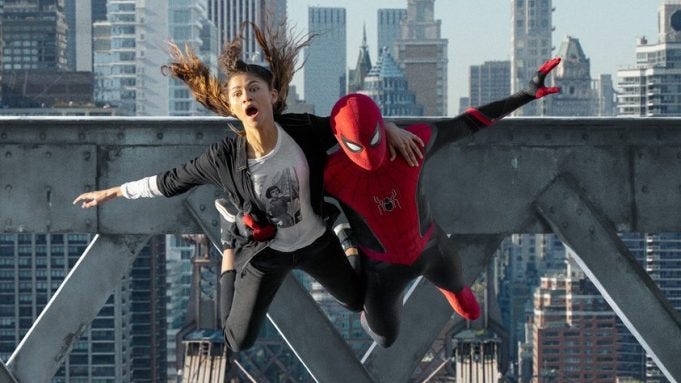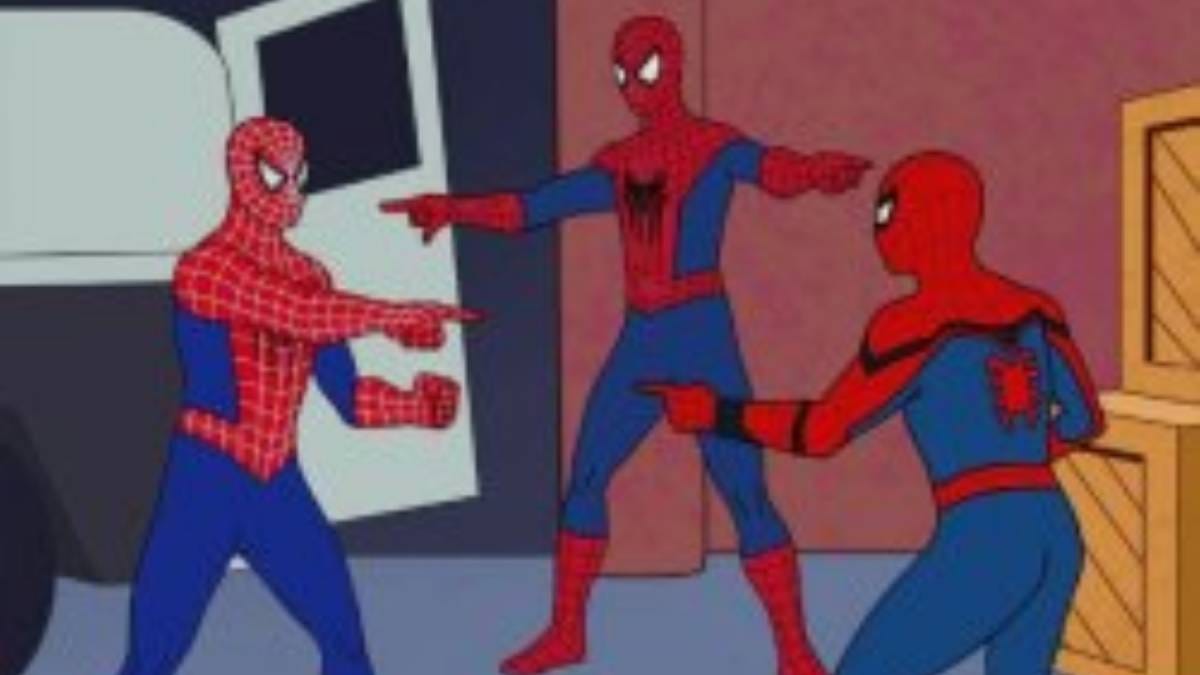Why I "Hate" Marvel: 'Spider-Man: No Way Home'
#157: "Spider-Man: No Way Home"
Edition 157:
Hey movie lovers!
As always, you can find a podcast version of this newsletter on Apple or Spotify. Thank you so much for listening and spreading the word!
PROGRAMMING NOTE!!
Welcome to the final day of “cram for the exam” week. We’ve been hitting two (ish) movie reviews per day leading up to the big reveal on Friday morning, when I’ll rank every 2021 release I saw this year (a list with well over 80 entries already).
Tuesday: West Side Story, Nightmare Alley, Being The Ricardos
Wednesday: Don’t Look Up, The Matrix Resurrections
Thursday (today): Spider-Man: No Way Home
Friday: 4th Annual! Every Movie in 2021, Ranked
**As with every year, the final rankings are going to reflect some asterisks for movies I haven’t seen yet this year that would probably rank highly on my list: The Tragedy of Macbeth, Drive My Car, The Lost Daughter, Red Rocket, Parallel Mothers.**
Spider-Man: No Way Home
(Theaters)
There’s a quote that has always stuck with me, spoken in 2019 by Joe Russo (he and his brother directed many of the biggest Marvel movies) in response to Martin Scorcese’s very public comments that he thinks Marvel movies are “not cinema.”
“We're just two guys from Cleveland, Ohio, and 'cinema' is a New York word. In Cleveland, we call them movies."
The obvious intention here is to deflate Scorcese’s pretentiousness, but there’s an implication that carries more punch than Russo, a super rich guy who now lives in Los Angeles, perhaps intended. ‘Urban vs. Rural’ is currently the great dividing line in the United States across the spectrum of issues, and it’s ironic to see it trickle down to something as trivial as the movie business.
Lost in the conversation about the survival of the theatrical moviegoing experience is the fact that for most Americans, the opportunity to see the best movies in a given year on a big theater screen simply no longer exists. Every year when I leave my movie bubble of Los Angeles (before that Chicago) and return to my parents home in North Carolina, I’m met with the reality that there isn’t a theater within a 50 mile radius that carries the latest awards contenders.
Instead, this year, there’s 18 showings of Spider-Man: No Way Home.
And frankly, people can’t get enough. Amidst the pandemic-era theatrical apocalypse, in which the highest grossing opening weekend for any movie was $75 million, Spider-Man opened to $250 million (more than 2.5x its projection, which is unheard of), and as of writing is over $516 million domestically and $1 Billion globally. It’s literally breaking the system.
Frequent readers of this newsletter might believe I admit those numbers through gritted teeth, because of my long-standing feud and frequent boycott of Marvel movies. One of the most common questions I get asked — why do you hate Marvel?
I don’t hate Marvel so much as I believe the MCU (Marvel Cinematic Universe, if you’re lucky enough to not be indoctrinated) to be some sort of mass hypnosis in which we’ve all decided instead of choosing which foods we like and want to eat, we’d rather hook ourselves up to a feeding tube at the end of a mass production assembly line.
For a conglomerate like Disney, the stakes are far too high to risk a project on the unique vision of any one person. Every aspect of these movies is made by committee, with respect to the investment of many many stakeholders, each with different priorities. Priority number one is always to appeal to the broadest possible audience, which is why the characters are so obvious and the plots are so predictable and there’s a constant need to hold the audiences’ hand and treat them as if they’re stupid.
I find this kind of thing incredibly patronizing, but I want to make the specific point that I don’t blame anyone who does enjoy the franchise. Marvel movies, and specifically Spider-Man, are an irrepressible joy machine, and I love the idea that a movie can make someone happy no matter what it is (though suddenly Scorcese’s comparison to theme park rides doesn’t seem so crazy…).
My biggest gripe with Marvel movies is that they’ve chosen to completely eliminate consequence from their storytelling, which I believe to be among the most important elements of a good movie. Here’s what I mean — if a character makes a mistake, or has a character flaw, or simply chooses one avenue over another, then there must be some consequences to his actions. At a fork in the road, one cannot take both paths. There must be stakes, there must be decisions. Yet too often these movies snap their fingers and make problems disappear, to have their cake and eat it too. I’ve come to call it The Chewbacca Problem.
Because of Marvel movies’ incredible popularity, the most dangerous thing about them is the way they’ve trained the expectations of an entire generation of movie (and TV) watchers to always get what they say they want, whether it’s unambiguous and obviously good or evil characters, non-stop fan service and wish-fulfillment, or reversing permanent storytelling decisions.
Marvel is like a parent who lets their child have candy every night for dinner, because that’s what the child says they want, so then any time someone offers them vegetables, or even a perfectly cooked steak, they throw a fit and demand candy.
The optimist in me (buried deep down somewhere) would like to believe that audiences will still respond to great storytelling. It’s a big reason why I’ve been putting out this newsletter for the last three years.
And as proof, I believe it’s no coincidence that the most successful Marvel movies both commercially and critically are those that had real stakes. I’m thinking of Avengers: Endgame (where Tony Stark dies and Captain America gets old…though whiny fans are demanding Chris Evans return at some point) and now this latest Spider-Man entry.
In it, Peter Parker wants to escape the complications created by the whole world finding out that he’s Spider-Man, so he asks Dr. Strange (a magician superhero) to cast a spell. Except the spell goes wrong, and suddenly there’s a bunch of villains from alternate universes who spill out. I won’t spoil anything, but a poor decision during the movie leads to the death of one of his dearest characters, and a realization at the end leads to some pretty drastic consequences for the character going forward.
It’s these elements that elevate the movie from its usual quip-and-CGI-punchfest backbone which as always is so perfect it’s uninteresting — Tom Holland and Zendaya are incredibly charming, the action sequences are on point, and everything is so shiny and neat it’s practically Pleasantville. The only flaw given to any characters who aren’t villains is the sin of caring too much or working too hard (Michael Scott would be proud). I’ll admit, this movie deserves a lot of credit for dodging the disease of Blockbuster Mumbo Jumbo, remaining clear and understandable despite a plot that involves magic, alternative universes, multiple Peter Parkers and like eight different sets of superpowers.
Of course, there’s a cynical way to view these seemingly real stakes as a kind of evil genius magic trick. For example, if Peter Parker regains his secret identity and nobody knows who he is including his friends and girlfriend, it allows for several more fresh (or recycled) stories to told. If he’s aging into college and then adulthood, the death of (~redacted~) makes things less complicated.
In a big picture sense, if there’s a multiverse, it allows the MCU to essentially take every single fork in every single road that has ever existed. Why have one Spider-Man when you can have three, why one villain when you can have six? Why come up with a new good idea when you can recycle both the Peter Parkers and the villains from successful movies in the past?
More stories, more ideas, more heroes, more villains, all equals more money, which is the reason any of these things exist.
If the MCU itself has a superpower, it’s the ability to always pay off fan service without cheapening its product. Somehow, time and time again they’re able to dance the fine line between giving fans exactly what they want now and also later. Having their cake and eating it too, every single time.
Marvel’s reward, in my mind, is the gigantic pile of cash they’re raking in every time they put out a new installment. They do not need critical support, and they certainly don’t need awards recognition.
You don’t need me to tell you whether this movie is worth seeing or not, because chances are by now you probably already have seen it or never will.
So as for the future of this newsletter? In every alternate universe, you won’t find much coverage of Marvel movies going forward. To each his own.



